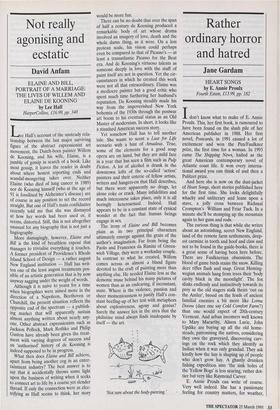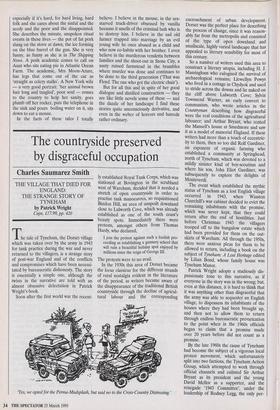Rather ordinary horror and hatred
Jane Gardam
HEART SONGS by E. Annie Proulx
Fourth Estate, £13.99, pp. 182 Idon't know what to make of E. Annie Proulx. This, her first book, is rumoured to have been found on the slush pile of her American publisher in 1988. Her first novel, Postcards, in 1991 caused a lot of excitement and won the Pen/Faulkner prize, the first time for a woman. In 1993 came The Shipping News, hailed as the great American contemporary novel of Atlantic coast life. It won every interna- tional award you can think of and then a Pulitzer prize.
And here she is now on the dust-jacket of Heart Songs, short stories published here for the first time. She looks delightfully whacky and unliterary and leans upon a stave, a jolly cross between Richmal Crompton's William and Friar Tuck. In a minute she'll be stomping up the mountain again to her guns and rods.
The curious thing is that while she writes about an astonishing, secret New England, land of the remote farm settlements, deep- est carmine in tooth and hoof and claw and not to be found in the guide-books, there is a great sense of having been here before. There are Faulknerian obsessions. The blood of game birds stains the snow. Killing deer rifles flash and snap. Great Heming- wegian animals hang from trees their 'body cavity black in the moonlight'. The fox slinks endlessly and instinctively towards its prey as the old stagers stalk theirs 'out on the Antler', brood on the feuds of ancient familial enemies a bit more like Lorna Doone (dare one say Cold Comfort Farm?) than one would expect of 20th-century Vermont. And urban incomers well known to Mary Macarthy, Alison Lurie, John Updike are buying up all the old home- steads, patronising the natives, considering they own the graveyard, discovering carv- ings on the rock which they identify as Indian when it was only grandad. They ask kindly how the hay is shaping up of people who don't grow hay. A ghastly drunken fishing expedition into 'the sink holes of the Yellow Bogs' is less searing, rather dot- tier but very like Raymond Carver.
E. Annie Proulx can write of course. Very well indeed. She has a passionate feeling for country matters, for weather, especially if it's hard, for hard living, hard folk and she cares about the sinful and the seedy and the poor and the disappointed. She describes the minute, unspoken ritual events in these lives — the pot of fat pork slung on the stove at dawn, the ice forming on the blue barrel of the gun. She is very funny, as funny as she is in The Shipping News. A posh academic comes to call on Aunt who sits eating pie in Atlantic Ocean Farm. The academic, Mrs Moon-Azure, has legs that come out of the car as `straight as celery stalks'. A New York wife — a very good portrait: 'her animal brown hair long and tangled', poor soul — comes to the country to help her sanity, goes plumb off her rocker, puts the telephone in the sink and pours boiling water on it, sits down to eat a mouse.
In the facts of these tales I totally believe. I believe in the mouse, in the sex- starved truck-driver obsessed by vanilla because it smells of the criminal lush who is to destroy him. I believe in the sad old farmer trapped into marriage by an evil young wife he once abused as a child and who now co-habits with her brother. I even believe in the murderous vendetta between families and the shoot-out in Stone City, a nasty ruined farmstead in the brambles where murder was done and continues to be done to the third generation (`That was Floyd. The one who got the electric chair').
But for all this and in spite of her good dialogue and distilled construction — they are like little novels some of these — and the dazzle of her landscape I find these stories quite unconsciously derivative, and even in the welter of horrors and hatreds rather ordinary.



























































 Previous page
Previous page